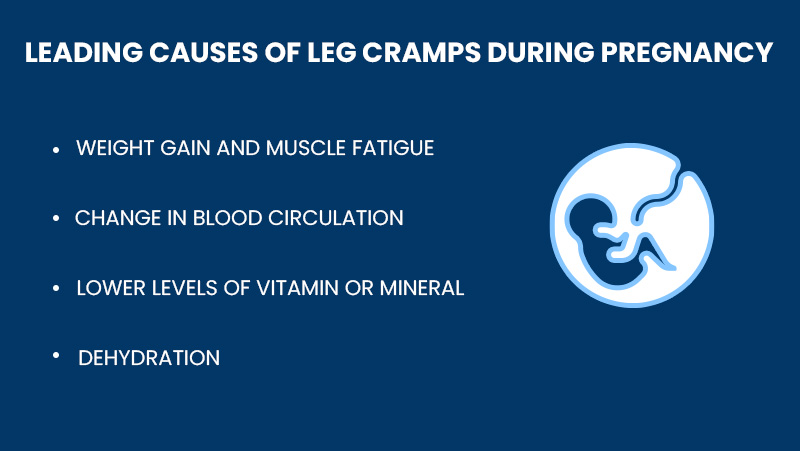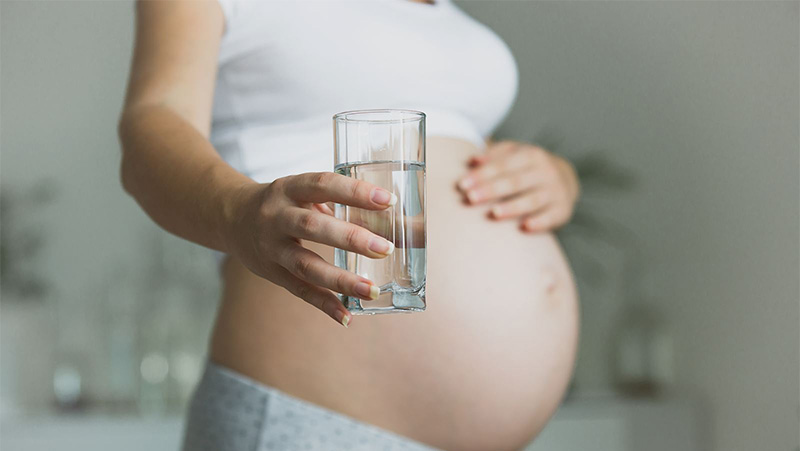Pregnancy is not always easy. This is undoubtedly a beautiful journey, but it can come with certain challenges. Just when you think things are getting better after going through all those morning sickness and heartburn in the first few weeks of your pregnancy, leg cramps show up.
Leg cramps are pretty common during pregnancy, especially in the second and third trimesters. Almost half of all pregnant women get these muscle cramps. These cramps often occur at night, exactly when you are trying to get the best night's sleep. Some even get these cramps while sitting still for a long time.
You can't always stop leg cramps from happening, but there are things you can do to ease the discomfort. Keep reading to know how.
What are Pregnancy Leg Cramps?
Around 3 out of 10, pregnant women experience leg cramps. These cramps mostly arise in the calf muscles but sometimes can also appear in your thighs or feet. When your muscles squeeze too hard, it's called a cramp.
A cramp normally takes place because of acid building up in your muscles that mostly strike at night and are more frequent during the later months of pregnancy.
Is It Normal During Pregnancy?
Yes, and you're not alone. As shared by the American Pregnancy Association almost half of all pregnant women go through leg cramps during their pregnancy at some stage or the other, especially at night.
While many expecting mothers experience these cramps, the level of pain and discomfort can differ, ranging from mild to intense.
Leading Causes of Leg Cramps During Pregnancy
Various factors contribute to pregnancy leg cramps, especially during the second and third trimesters when your body is frequently going through a bunch of changes.
Weight Gain and Muscle Fatigue
Weight gain during pregnancy adds extra pressure on the muscles of your legs making them feel more tired than usual. Additionally, your growing uterus puts extra pressure on the blood vessels, leading to increased leg cramps.
Change in Blood Circulation
Pregnancy causes a significant increase in your blood volume leading to slower circulation that further results in swelling and cramping in your legs.
Lower Levels of Vitamin or Mineral
The dietary and hormonal changes during pregnancy can lower your calcium and magnesium levels, leading to leg cramps.
Dehydration
Not drinking enough water is one of the leading causes of cramps during pregnancy. Here's how— Water helps keep your body hydrated, making it easier for your heart to pump blood, deliver oxygen to your organs and muscles, and reduce the level of cramps and circulation problems.

How to Prevent Leg Cramps When Pregnant?
Following are a few simple steps you can follow that will not only help stop and ease those annoying leg cramps during your wonderful pregnancy journey but will also help you sleep better.
Staying Hydrated
- Drink 8 to 12 glasses of water daily during pregnancy.
Stretching Before Bedtime
- Stand away from a wall, about a distance of an arm’s length.
- Place your hands on the wall.
- Step your right foot back, keeping both heels on the floor.
- Bend the left knee and feel the stretch in your right calf.
- Hold for up to 30 seconds and switch legs if needed.
Using Pregnancy Pillow
- Try using pregnancy pillows for better support and alignment of your body preventing leg cramps and back aches.
- The right pregnancy pillow can work miracles, especially the one from Eli & Elm.
ELI&ELM SPECIAL OFFER!
Heat Application
- Ease cramps by applying heat.
- Using a microwave-safe cloth bag filled with rice or even a sock can do the trick.
Massaging the Area
- Self-massage the cramped area gently for 30 seconds to a minute.
- Try going for a prenatal massage from an experienced therapist if required
Exercising
- Stay active. Also, try working out if possible.
- You can try prenatal yoga, walking, or swimming.
- Prevent leg cramps by stretching before and after exercise.
Avoid Being Inactive
- Try to walk around every hour or two, especially if it's been long since you are sitting.
What to Do Immediately After Getting a Leg Cramp?
- Bend your feet and point your toes upwards as soon as you feel a leg cramp. Hold onto this position until you feel some relief.
- Next, slowly raise your leg after flexing to help ease the cramp.
- If possible, walk around for a few minutes to get some relief.
- Finally, massage the cramped muscle to alleviate tension and cramping.
Do I Need to See a Doctor for a Pregnancy Leg Cramp
If leg cramps are not letting you sleep and home remedies aren't helping, it's important to speak with your doctor right away. They can provide you with the required treatments and medicines for a better night’s sleep.
Sometimes, leg cramps might be pointing towards a serious issue called deep vein thrombosis (DVT) as pregnant women have a higher chance of getting blood clots than others.
Do not hesitate to reach out for medical assistance if you notice—
- Extremely swollen legs
- Intense leg pain while standing
- Warm red spots on your legs
- Severe, ongoing, or worsening leg cramps
- Bulging veins in your legs
Conclusion

Dealing with leg cramps during pregnancy can be painful and annoying at the same time. However, you have the power to make them happen less often by taking good care of yourself, drinking enough water, and accepting the changes in your body.
Sources:
American Pregnancy Association: Leg Cramps During Pregnancy





















